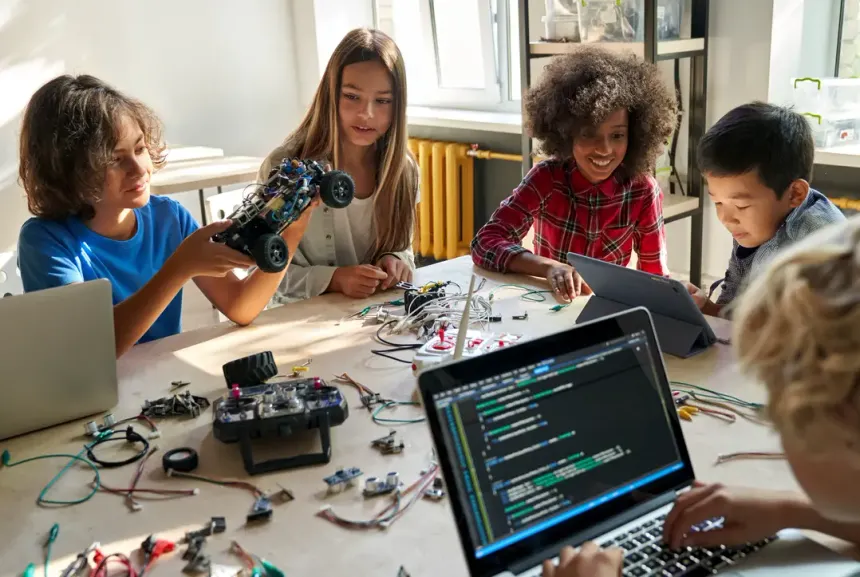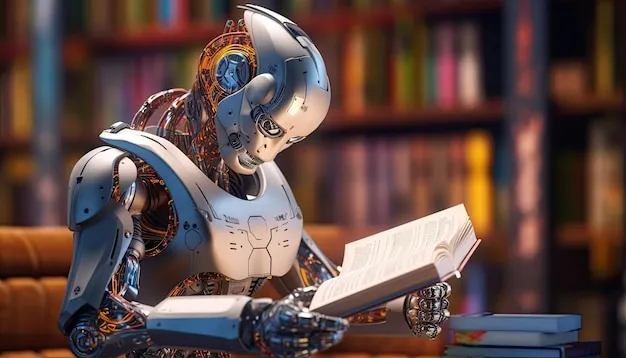The rapid rise of Artificial Intelligence (AI) is revolutionizing various industries, and education is no exception. AI-powered tools and technologies are reshaping traditional teaching methods, making education more accessible, personalized, and efficient. However, this transformation comes with challenges, including concerns about the role of human teachers, ethical considerations, and potential biases in AI systems.

How AI is Transforming Traditional Education
1. Personalized Learning Experiences
AI enables personalized learning by analyzing students’ learning patterns, strengths, and weaknesses. This helps tailor educational content to individual needs.
- Adaptive Learning Platforms: AI-driven platforms like Coursera, Duolingo, and Khan Academy adjust lesson difficulty based on a student’s progress.
- AI Tutors: Virtual AI tutors provide instant feedback, helping students understand complex concepts without waiting for human intervention.
- Customized Lesson Plans: AI suggests learning materials based on students’ interests and past performance, ensuring more engagement and better retention.
2. Automation of Administrative Tasks
Teachers and educational institutions spend a significant amount of time on administrative work. AI can streamline these tasks, allowing educators to focus on teaching.
- Automated Grading: AI can grade multiple-choice tests, essays, and even subjective answers with natural language processing.
- Attendance Management: Facial recognition and biometric systems can track student attendance automatically.
- Smart Scheduling: AI optimizes class schedules, reducing conflicts and improving time management.
3. AI-Powered Virtual Classrooms
With the rise of online learning, AI has enabled virtual classrooms that replicate the traditional school experience.
- AI Chatbots for Student Support: These bots provide instant responses to student queries, reducing the burden on teachers.
- Voice and Language Processing: AI can translate lectures into multiple languages in real-time, making education more inclusive.
- Immersive Learning with AI: Virtual Reality (VR) and Augmented Reality (AR) powered by AI create interactive learning environments, making subjects like science and history more engaging.

Challenges of AI in Education
1. Reduced Human Interaction
While AI offers many advantages, one of the biggest concerns is the reduction of human interaction in learning.
- Lack of Emotional Intelligence: AI lacks the empathy and emotional intelligence that human teachers provide.
- Dependence on Technology: Students relying too much on AI may struggle with critical thinking and interpersonal skills.
- Less Teacher-Student Bonding: Traditional education fosters personal relationships that AI cannot replicate.
2. Ethical and Privacy Concerns
AI systems collect vast amounts of student data, raising concerns about privacy and security.
- Data Security Risks: Student information can be misused if not protected properly.
- Bias in AI Algorithms: AI models can sometimes reinforce biases, leading to unfair assessment and learning opportunities.
- Surveillance Issues: AI-based monitoring can lead to excessive surveillance, potentially invading students’ privacy.
3. Accessibility and Cost Barriers
Despite AI’s potential, not all students and institutions can afford or access these technologies.
- High Implementation Costs: Schools with limited budgets may struggle to integrate AI-driven tools.
- Digital Divide: Rural and underprivileged students may not have the resources to benefit from AI-powered education.
- Teacher Training Requirements: Educators need specialized training to effectively use AI tools, which may not be feasible for all.

Future of AI in Education
1. AI-Assisted Career Guidance
AI can help students choose careers based on their skills, interests, and academic performance.
- Predictive Analytics: AI analyzes student data to suggest the most suitable career paths.
- Skill Development Programs: AI can recommend online courses and certifications tailored to individual career goals.
- Job Market Insights: AI provides real-time updates on industry trends and job opportunities.
2. Enhanced Special Education Support
AI can offer better learning experiences for students with disabilities.
- Speech Recognition and Assistive Tech: AI-powered speech-to-text and text-to-speech tools aid students with hearing or speech impairments.
- Customizable Learning Interfaces: AI modifies content to suit the needs of students with dyslexia, ADHD, and other learning difficulties.
- AI-Powered Sign Language Translators: AI tools help bridge communication gaps for hearing-impaired students.
3. Lifelong Learning with AI
AI facilitates continuous learning beyond traditional classrooms.
- AI-Driven Skill Development: AI-driven platforms allow individuals to upskill and reskill as per industry demands.
- Corporate Training Programs: AI helps companies design training modules tailored to employees’ needs.
- Global Education Access: AI-powered platforms make quality education available to students worldwide.

Conclusion
AI is undeniably transforming education by making learning more personalized, efficient, and accessible. However, it also raises concerns about reduced human interaction, ethical considerations, and accessibility challenges. Striking a balance between AI and traditional teaching methods will be key to ensuring a holistic and effective education system. The future of education lies in leveraging AI as a supportive tool rather than a replacement for human educators.
Why STEM Education Is America’s Secret Weapon for Future Success






